Lillian Helms Polley and the Music of Lincoln
This brief account of the life and career of Lillian Helms Polley was gleaned from the archive of her materials that is housed in the Polley Music Library in Lincoln, Nebraska. The many programs, personal notes and memorabilia, manuscripts, letters, newspaper articles, reviews, and photographs in the archive collectively serve to draw a portrait of a woman who was central to the musical life of Lincoln during most of the twentieth century. Indeed, her gift to the city of a public music library keeps her spirit alive even into the current century.
Many of the historical items were digitized so as to make them available online for public perusal. Some of those files are included in this page. Over 200 items appear in the Polley Music Library section of the Nebraska Library Commission’s “Nebraska Memories” page.
This Polley Music project was supported in part by the Institute of Museum and Library Services and Technology Act as administered by the Nebraska Library Commission. Additional funding was provided by the Lincoln City Libraries. We are extremely grateful to both of these organizations for making this presentation possible.
“Music has been my life; it’s all I know. I can’t remember not reading music anymore than I can recall not being able to read words. I love Lincoln; it’s been my home since I was a baby and will be until I check out at Wyuka. I am a part of Lincoln’s history just as Lincoln has been part of my life.” (Lincoln Journal Star, July 6, 1971)
“Nothing has ever come into my life that could take music out of my life. Other things disappeared – didn’t stay – but music remained. I had to stay with music.” (Lincoln City Libraries Inter-Department Communication, September 21, 1966)
In these two quotes we have the essence of Lillian Helms Polley – the woman, the musician, the teacher, and the giver of an invaluable resource to the city of Lincoln.
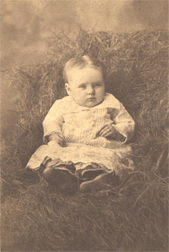
Photo of baby Lillian
This charming, serious little girl was born Lillian Dobbs, May 18, 1881, in Creston, Iowa. She was the daughter of Edward O’Hail Dobbs and Cora Belle Henkle. On the first page of her personal scrapbook she preserved a genealogy which traces her familial roots back to Ireland.
Her father, an investment banker, died of tick fever when Lillian was just an infant. In order to help out her struggling mother, Lillian’s uncle, Elmer Henkle, (of Henkle and Joyce Hardware Company in Lincoln) brought the baby to her grandmother, Candace Cargill Henkle, who lived in Lincoln. Candace and the young child were “inseparable”, and Lillian believed any success which came to her should be credited to her grandmother.
Lillian’s first public appearance, vaguely remembered, was at the opening of the Herpolsheimer building in Lincoln. It was a major social event celebrated with a ball and a grand march. She was a very small girl marching proudly at the end of the parade as the Tar Bucket. It had been “tenderly explained” to her by her uncle how important the tar bucket was to the covered wagon trains. She was four years old.
In the late 1880s the Henkle home at 11th and C Streets was convenient for school at Capitol Elementary and music lessons at the Nebraska Conservatory of Music at 13th and L Streets. She began her piano lessons at the age of six. She was very small, and could not reach the pedals on the piano, but she played for church socials anyway.
“I take lessons at the Nebraska Conservatory. Mr. Hadley makes me practice two hours a day and my hands are so small I always have to clean the lamp chimneys.“
After she grew a bit, so also did her repertoire, as seen in this program.
She rode her bicycle to Havelock, carefully avoiding the street cars, to teach piano and organ lessons for 25 cents a lesson.
“The neighbor children were pleased to have a little help counting time.“
She used the garnered quarters to pay for piano lessons with Professor Hadley at the Conservatory. She also accompanied for Clemens Movius’ voice students and used that money to pay for voice lessons with him. At the same time she studied Harmony with Lucy Haywood. From all accounts, she was a very fine young student, as can be seen in these 1890s reviews from the Nebraska State Journal.
Lillian continued her music studies while she attended Lincoln High School. While she was there she was given permission to study French and German at the University of Nebraska; this served her well in her later vocal career. She graduated in piano from the Nebraska Conservatory of Music in 1896. She was fifteen years old.
From 1897 to 1899 Lillian was an accompanist and voice coach in the Voice Department of the Conservatory. Some of Lincoln’s outstanding musicians of the time began to take notice of her.
"Carrie Belle Raymond encourages me. She knows so much and is so helpful."
She was also leading a busy life as a recitalist and church soloist.
"I registered at the University in 1900. I tried to carry a full schedule but I'm singing at St. Paul's Church and Matinee Musical and playing for Mr. Movius and studying with him."
Lillian had hoped to graduate from the University in 1905, but music made many interruptions in her academic schedule. She was invited by her aunt in Chicago for visits so she could hear fine music. She was in high demand as a performer at many local venues including the ProCathedral, St. Paul's Methodist Church, Trinity Methodist Church, Wesleyan University, First Presbyterian Church, the Unitarian Church, the Jewish Synagogue, and the First Church of Christ Scientist. Like many musicians, she performed at various religious institutions without regard to their affiliations. It was the music that was important.
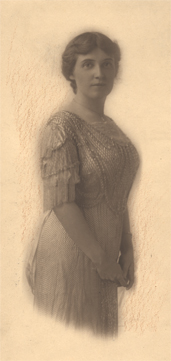
Lillian as a young woman
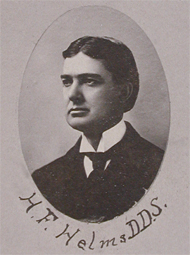
Henry Finley Helms
She was always described as a charming performer with a particularly pleasing stage presence. This contemporary newspaper account of an incident during a concert serves to illustrate her public persona:
"The value of quick wit and a sense of the humorous in saving the situation was illustrated at a recent musicale during the singing of a dainty lullaby. The vocalist [i.e., Lillian] had artistically modulated her voice until her audience felt that the cradle was about to stop, when an awful commotion suddenly arose at the door in the arrival of some late comers, who were not aware that a program was in progress. Everybody looked at the singer, who was obliged to stop, but instead of showing signs of irritation she laughed spontaneously and said quickly, "I hope the baby won't wake." As soon as the fresh guests were seated she began the song over again and sang without loss of effectiveness."
Everywhere Lillian performed she was received with great enthusiasm. All of the reviews emphasize the beauty and clarity of her voice as well as her personal charm. She was quite a lovely young woman, with the red hair and blue eyes indicative of her Irish heritage; she stood just over five feet tall.
In 1902 an additional interruption to her career occurred. She met young H. Finley Helms, a popular young dentist and teacher on the faculty of the University Dental College who also had a private practice located in the Burr Block on O Street. They became "enamored" and were married on December 17, 1902.
"We are building a new home on north 24th Street, and there is little time for singing."
Sadly, their life together was to be very short. Helms died suddenly in their new home on July 31, 1905. In the typical fashion of newspapers of the day, the death was described in great detail. Apparently he had complained of a headache, and Lillian had used cold compresses on him to try to relieve the pain. A bit later she heard him fall in the bathroom. A doctor was summoned, but Helms died two hours later of a brain hemorrhage.
"With his sudden death two years later all was ended. Living seemed useless except for Grandmother...and there was music, so endless, so much to learn."
After her husband's death, Lillian went back east to study with William Nelson Burritt in Carnegie Hall.
"It was the fall of 1905. I went to New York in a heavy widow's veil. I soon discovered that the ring and the veil were no protection."
One can only wonder what sort of problems a beautiful young widow from the prairie might have encountered in the "big city."
When she returned to Lincoln, she continued her concertizing and teaching at the Nebraska Conservatory. Again, a review describes her considerable talent. In the mean time, Mr. Movius had gone to Wesleyan to join its music faculty. Under his recommendation she was offered a position there as a voice teacher, and she was on that faculty for two years from 1908 to 1910. During that time she also toured extensively throughout the area with other faculty members. Examples of programs from the period include performances at the Shelby Opera House in 1908, the Kerr Opera House in 1909, and the Seward Opera House in 1910.
In 1910 Mr. Crancer, of Crancer Music Store in Lincoln, took Lillian to meet Willard Kimball who was the owner and director of the University School of Music. She was hired immediately and "began to teach in a little room at the top of the stairs." Her teaching career at the University of Nebraska spanned the next twenty-eight years. When she joined the school, some of her fellow faculty members included Mortimer Wilson, Mrs. Will Owens Jones, Mr. and Mrs. Hagenow, Carrie Belle Raymond, Henry Eames, Howard Kirkpatrick, Charles Mills, Carl Steckelberg, and John Rosborough. These names read like a Who's Who in Lincoln music history, and many of these individuals went on to national and international recognition. Lillian was in her element.
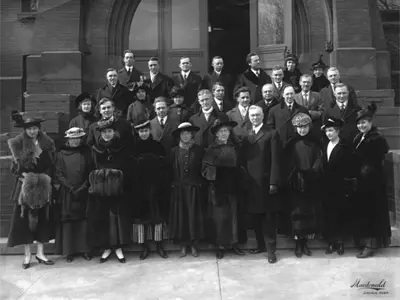
University School of Music faculty, 1916
Back from L to R: 1. J. Frank Frysinger, organ 2. John Rosborough, theory 3. Phillip Hudson, piano 4. Staats, organ 5. Sidney Silber, piano 6. Marguerite Klinker, piano 7. Louise Zumwinkle-Watson, piano
1. Don Berry, trumpet and brass 2. George Kimball, office
1. Beth Bonnell Davis, voice 2. Vera Upton, voice 3.Connie Pettis, head of South Branch of School of Music 4. Charles Mills, voice 5. A. Loeb, strings 6. Morley, piano tuner 7. Everett Carter, treasurer
1. Carl Steckelburg, violin 2. Rex Fair, flute 3. John Prince, drama 4. Roger de Bouzon, voice 5. Howard Kirkpatrick, voice 6. Earnest Harrison, piano
1. Edith Pfesson, secretary 2. Kathryn Kimball, piano 3. Lula Karnes, voice 4. Ruth Bagnell, piano 5. Ruth Pilcher, piano 6. Mrs. Will Owen Jones, piano 7. William Kimball, director 8. M. Widener, piano 9. Lillian Polley, voice 10. Luna Schuler Smith, piano
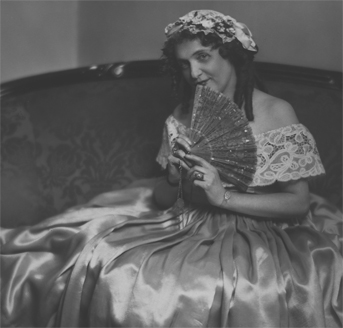
Lillian's teaching duties included both classes and private students. She taught Methods and Song Literature. She also continued a heavy performance schedule, appearing all over the mid-west as a soloist and for choral concerts at various colleges. She also began judging vocal contests. There is room here for only a very small selection of the programs from this period, but perhaps they will serve to indicate the breadth of her activities. They include programs entitled "Shakespeare and Music" 1911, "American Songs" 1912, and a performance at the Crete Opera House 1915. For recitals like these she frequently appeared in costume.
While her teaching and performing kept her busy during the regular school year, she found time to study with teachers in Europe in the intervening summer months. She worked with Alberto Randegger and Celine de Polkowski in London in 1909, and with Madame Arthur Nikisch in Germany that same year. In 1911 she was the private student of Madame Emma Albani who was the leading soprano at the Covent Garden Opera. Richard von Zur Muehlen accepted her as a student in 1913 at his home in Steyning, England. Also, in 1911 she acted as the European music correspondent for the Western Musical Herald of Kansas City.
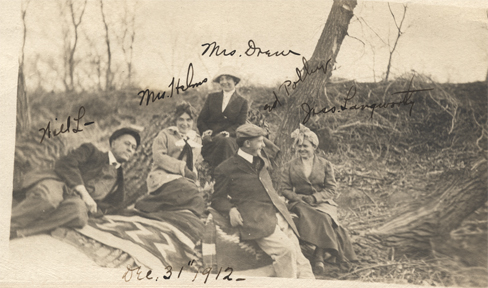
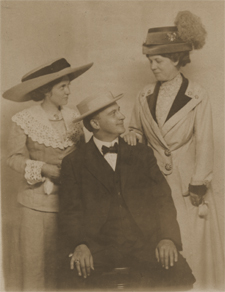
In spite of all these activities, she seems to have had the time to be a normal young woman, at least once in a while. A picture from 1912 shows her at a New Year's Eve social event with other young people her own age, including a young man named Ed Polley.
On June 29, 1914 Lillian married Edward Harrison Polley. Ed was born in Seward, Nebraska and was a pharmacist in Lincoln. He was also known as a "Good Roads" leader and acted as secretary for the association of the same name whose goal was to improve Nebraska highways. A picture taken in about 1917 shows Lillian and Ed with Lillian's mother, Cora Dobbs.
This second marriage did not seem to interfere as much with Lillian's career, and she continued her teaching and singing. She was always interested in the mechanics of singing, and in 1918 she even managed to wangle her way into an anatomy class at the University, much to the dismay of the Registrar and the amusement of her fellow faculty members as seen in these two documents.
She was also free to study in Chicago in the summers between 1921 and 1932 with the nationally famous teachers Herbert Witherspoon and Oscar Saenger. These associations led to summer teaching positions at the Chicago Musical College for six years. Here are portraits taken of her during her Chicago years.
Lillian was an astute businesswoman, and she knew how to promote herself. Here is an advertising flyer she circulated in the late 1920s. It was a good thing that she used materials like these. In 1930 the University "bought" the School of Music from Willard Kimball. Lillian stayed on to teach but there were a lot of departmental political hassles. She gathered up a number of letters of recommendation from her teachers, colleagues, and students and presented them to the Chancellor's office. Finally in 1932 she was made an "official" Professor of Voice as recorded in this letter from Howard Kirkpatrick, then director of the new University of Nebraska School of Music.
As she got older, she turned increasingly to her teaching activities and sang less and less in public. She had always been very interested in teaching young people to sing, and early on had founded the Youth Division of the Matinee Musicale organization in Lincoln. In the 1930s she began her work with very young children's voices as part of a project assigned to her by the New York Singing Teachers' Association, and gained national recognition for her work. A 1934 United Press article read:
"Mrs. Lillian Helms Polley of the University of Nebraska voice faculty believes that the time to teach youngsters how to sing is when they are just out of the cradle. Her voice-training class for children from 6 to 9 has been so successful that Mrs. Polley next year will open a class for four-year-olds."
She received letters from parents and teachers all over the country who found her work intriguing and useful. She also lectured on the subject, and her notes for these talks have been preserved in the archive. Here are some of her thoughts:
"...children make greater demands on my knowledge and experience than adults. The younger the child the harder I work. When I began to work with children I was amazed to find the same problems that the adults labor over."
"Voice production through singing is a tool for improved sociability, for health, happiness, and self-expression."
"Good singing habits include many muscular skills and their rhythmic coordination plus the coordination between the mental and physical."
"By the way, all the advantages claimed for athletics may also be credited to singing."
"One of the strongest impressions I received during early periods of study with renowned teachers was the number of old students who were learning how to sing, how to use their voices, and how to break bad habits."
"[We must] teach correct singing habits when the students are young so their later study can be devoted to the study of literature."
"...there was a tradition which said the child must not be taught how to sing until two years past maturity, after the child has stopped growing. Be sure the voice is settled before accepting them for instruction."
"In my judgment, the child's first music teacher should be a singing teacher. But the singing teacher should be educated to be a music teacher....That early instruction is the most important of the child's life and should be given by really competent people."
"Public school teachers have limited [musical] training, limited time, and too many students."
"Public school music takes for its premise the human voice as the economical and practical medium or instrument with which to acquire a knowledge of music. Every child can afford a voice and he does not forget it or leave it out on the playground. And it is the only instrument which is continually adequate for the child at every age and size."
"Even in the best of school systems with the best of teachers it seems to me the private singing teacher has a place [especially] in the care of the very talented child."
Lillian lectured on other subjects as well, including such topics as "Music in the Home", "Indian Lore in Song Literature", "Music as a Profession for Women", and "Group Singing."
"I believe in music, and since music is essentially personal in its nature and object, it is native to that one place where we may be and usually are quite ourselves - our home!"
"When Mr. [Thurlow] Lieurance followed his best instincts he wrote closer to the Indian mode. But of course these did not meet as ready sale as the 'Waters of Minnetonka' and a composer must pay rent and buy clothes."
"I think music is the nicest profession in the world although the financial returns are not alluring."
"Whenever I see a group of people I always wish they would sing. I think singing has a contribution for almost any group activity."
Another project of hers during this era was her singing group which she called her “Carolers”. It was made up of some of her young students and performed at various public locations and on a series of radio programs on station KFAB called “Around the Calendar with the Carolers.” Here she is on the subject of altered programming schedules:
“I knew the frustration of bowing to the inevitable clearing of the schedules to accommodate a ball game.“
In spite of such experiences Lillian enjoyed her association with the radio community in Lincoln and frequently acted as an announcer and writer of program notes for radio shows given by local faculty members and visiting artists.
In 1937 a “reorganization” of the music department was undertaken by the Board of Regents. Probably because of her age, her University position was again in jeopardy. She went into action and gathered up more letters of recommendation. In June of 1937 she received a letter from the Regents offering her an appointment for the 1937-1938 school year. The letter included this sentence: “You shall give no instruction in your subject off the University of Nebraska campus.” There are no written records of Lillian’s response to this dictum, but it should be noted that this was the last year she taught at the University.
Being more or less run out of the University certainly didn’t tarnish Lillian’s national reputation. In 1939 she was named to the publication Leading Women of America.
Her decision to retire from the faculty might also have been influenced by Ed’s declining health. She continued to teach at home so as to be near him. A newspaper article from 1940 reported of Ed, “When Mrs. Polley is teaching, he is the guardian of the ice chest, and lends lemons to questing neighbors.”
Ed died in 1948 after a long illness. Lillian’s response was, “Mr. Polley’s death in March, 1948, made travel important for the next three years.” She had been to Europe many times, so in 1950 she set out on a trip around the world which lasted for about four months. Her passport indicates visits to the Philippines, Hong Kong, Indochina, Japan, India, Egypt, Syria, Lebanon, Jordan, and Greece.
In 1951 Lillian added a new interest to her life. In March of that year the Lincoln Circlet Theatre needed a replacement for the part of the Dean of Women for their production of “Goodbye My Fancy.” She got the part, and then proceeded to do seven more productions. A 1954 newspaper article was entitled, “Circlet Actress Finds Play, Traveling Akin.”
"Doing a Circlet Community Theater play is something like flying around the world–at least it is ‘just like taking a trip,’ says Mrs. Lillian Helms Polley, singer turned dramatist…. Mrs. Polley, who actually has flown around the world, likens acting to tripping because ‘when you prepare for a play you give up about six weeks. You lead an entirely different life, spend time with different people. It’s truly an enjoyable experience.‘”
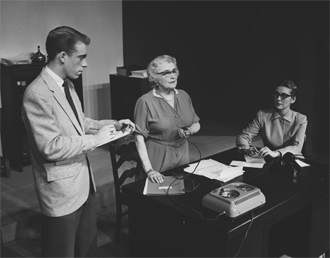
A partial list of plays she was in includes “The Curious Savage”, “The Heiress“, “The Silver Whistle“, “The Solid Gold Cadillac“, and “Goodbye My Fancy.”
She was a “natural” on stage because she could use her trained voice in the dramas. Over the years the Lincoln Community Theater awarded her three “Oscars” for Best Actress performances.
Lillian kept up her teaching during this time, but carried a much lighter load of students than she had in the past. Her last fine student was Diane Knotek [Butherus] who, as Miss Nebraska in 1956, won the Miss America Talent Award for her lovely singing.
Lillian’s high energy levels continued as she got older. She kept up her professional and civic affiliations with the Wooden Spoon, Nebraska State Music Teachers’ Association, Pi Kappa Lambda, Delta Omicron, the Lincoln Symphony Guild, Altrusa, P.E.O., and the Lotus Club. For the last group she wrote a history of the old University School of Music which was presented in 1967 and then published in the local newspaper in conjunction with Lincoln’s centennial celebration. Her archive includes the manuscript of that history.
The late 1960s also marked the beginning of Lillian’s last great project in Lincoln, our beloved Polley Music Library. She said she got the idea for a public music library way back in the 1930s. She had been concerned by what happened to the music that was being donated to the University of Nebraska at that time and was especially distressed when the library of Carrie Belle Raymond simple “evaporated” from the shelves. She became determined that her large collection of scores and books would not suffer the same fate.
In 1966 she gave the Lincoln City Libraries $12,000 to match a grant of Federal funds. The money was used to finance the building project which added the north and east wings to the two-story Bennett Martin Library and included a space that would become the Polley Music Library. She envisioned it as the beginning of a Performing Arts section in Bennett Martin Library. Her goal was to provide a place to house her collection and those of other contributors. It was to become a reference resource for students and teachers.
“People from the surrounding areas and schools could look to Lincoln for a broader knowledge of the literature of music.“
The local newspaper reported that the need for a public music library “seems urgent to a woman who believes music in life and life in music must never end in Lincoln, Nebraska.”
The building project was completed in late 1968, and in January of 1969 Lillian received an invitation to attend a preview open house. Then, with typical energy, she proceeded to catalog her collection and to gather up many other scores and books from her musician friends in Lincoln. Polley Music Library was alive and well.
Her dream had come true, and her last years were spent caring for the music in her library. In addition, she left her estate in trust to the City of Lincoln and its citizens. In 1971 the Lincoln Star reported, “After her death the income from her estate will help maintain the music library. Mrs. Polley said, ‘That way I know the library will last. It’s my gift.'”
On March 5, 1973 Lillian Polley signed her will in which she left her estate to the Lincoln City Libraries. It reads in part:
“The net income from this trust fund shall be utilized for the creation, maintenance and improvement of a music room and music reference library at the Lincoln City Library, Lincoln, Nebraska, to be known as the Polley Music Reference Library.“
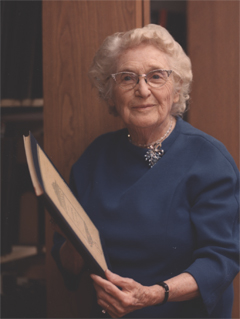
Lillian Helms Polley in the Polley Music Library
Lillian died March 24, 1978. Her funeral book was brought to the library by her cousin, Giles Henkle. Her remains are at Wyuka, but her spirit and legacy live on in our Polley Music Library. Indeed, her benevolence has benefited a far larger area than she had envisioned; this library has enriched the lives of people throughout the nation and the world. What a wonderful gift this woman gave us all!
Contact Us
Lincoln City Libraries
136 South 14th Street
Lincoln, NE 68508
402-441-8500
